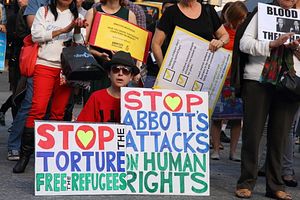A new report into the conditions of asylum-seeker children has been released in Australia to predictable turmoil and division. A United Nations working group this week stepped in to defend the Australian Human Rights Commission president Gillian Triggs after attacks from the government last week.
The Human Rights Commission report The Forgotten Children, which decried the conditions in which the 300 children still in detention are living, has been called a “transparent stitch-up” by Tony Abbott. He was supported by senior government ministers such as Attorney General George Brandis and Immigration Minister Peter Dutton. The latter took over the role from Scott Morrison, who Abbott says should be thanked for his role in ensuring that there are fewer children in detention, given that he “stopped the boats.” The report was handed to the government in November and only made public last Wednesday, but reactions were acrimonious and split long before Wednesday.
Asylum seekers, arrivals by boat, and children in detention have been fraught questions in Australia for years, though it’s arguable the Tampa incident of “children overboard” began what has been a long cycle of fear and heated argument over just what is the correct treatment of refugees: stopping the leaky, dangerous boats run by “opportunistic” smugglers or allowing beleaguered people into a nation of settlers? Offshore processing and settlement in places like Cambodia (not always friendly to refugees) or Papua New Guinea has been problematic and another season of riots just ended. This is the context in which the report has been released.
Some of the recommendations for the report included releasing all families and children from detention, closing the Christmas Island facility and, possibly most contentiously, establishing a royal commission. This last point received 87 percent support in a Fairfax poll Friday, though it should be noted that the readers of the company’s papers are more broadly sympathetic to refugee causes than, say, News Limited readers. The Australian, a News Limited broadsheet, alleges political bias in Professor Gillian Triggs, who oversaw the report and points out that far, far fewer children are in detention than in 2013 (under a Labor government) when they numbered 1992. Newspapers also revealed that Professor Triggs, a former barrister, was apparently asked to step down not long before the report was released. She and her report are accused of strong bias, backbenchers in the Liberal government have called for a parliamentary inquiry into this and also called for her resignation.
Triggs was appointed in 2012 for a five-year term and cannot apparently be dismissed from her role outside of gross misconduct or bankruptcy. Queensland backbencher George Christensen said he had more hope of impartial advice from newspaper Green Left Weekly than Triggs. In contrast, Greens and Labor politicians have been supportive. The UN working group on arbitrary detention, however, has said this week that the group’s statements were authoritative and reliable. Fifty human rights lawyers and both the Bar Association and the Law Council of Australia have also supported Triggs and decried attacks on her as threats to democracy.
Helen Clark was based in Hanoi for six years as a reporter and magazine editor. She has written for two dozen publications including The Diplomat (as Bridget O’Flaherty), Time, The Economist, the Asia Times Online and the Australian Associated Press.

































